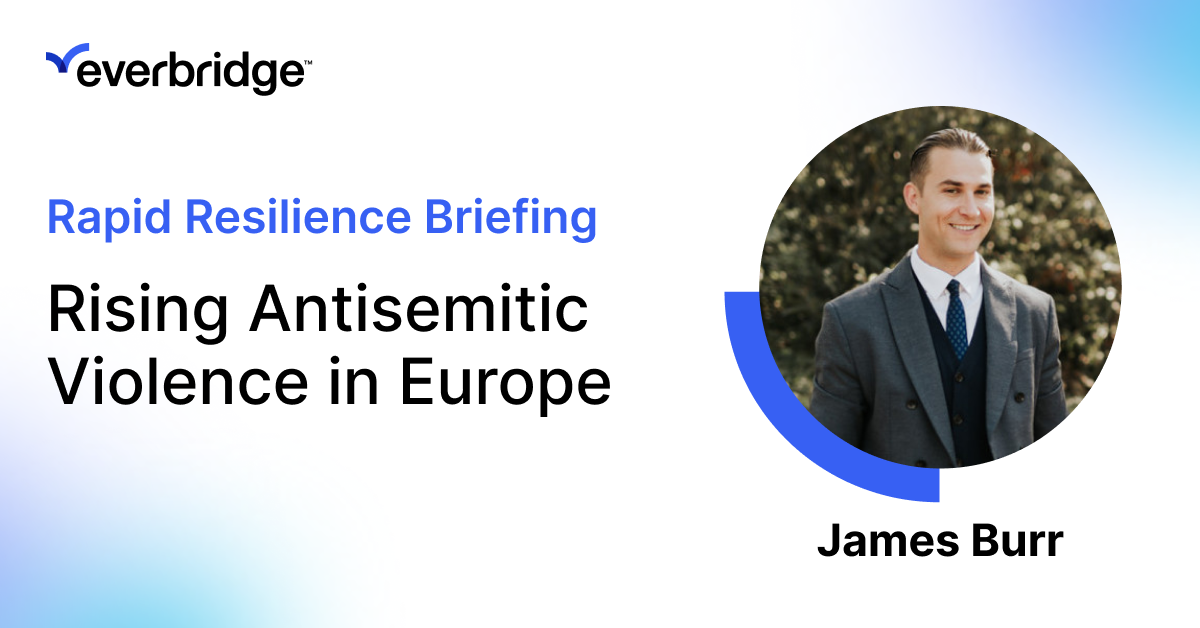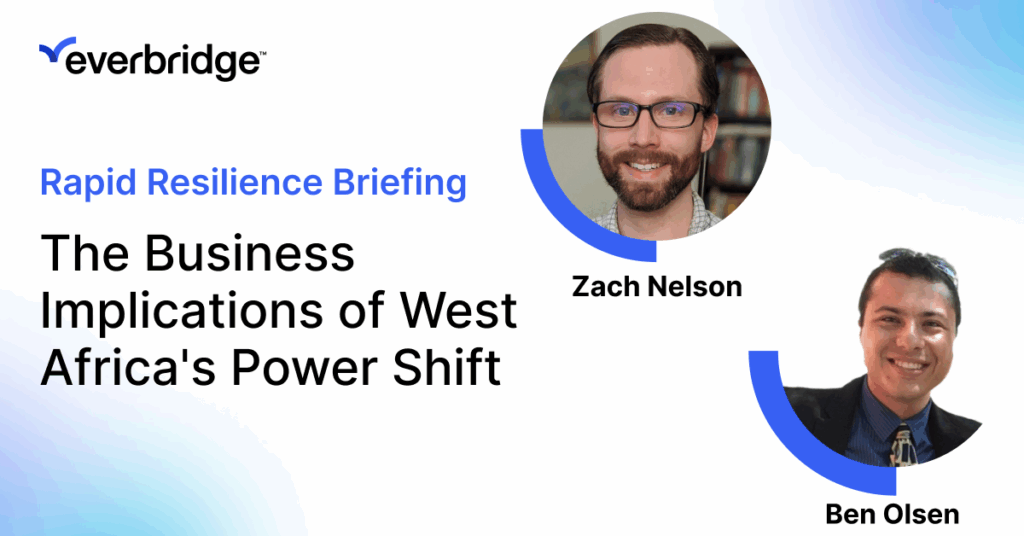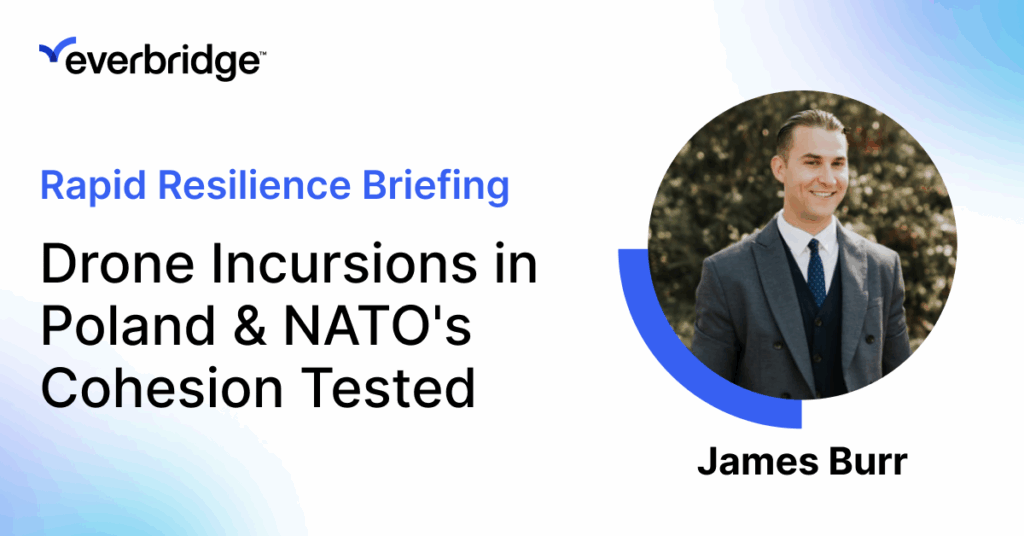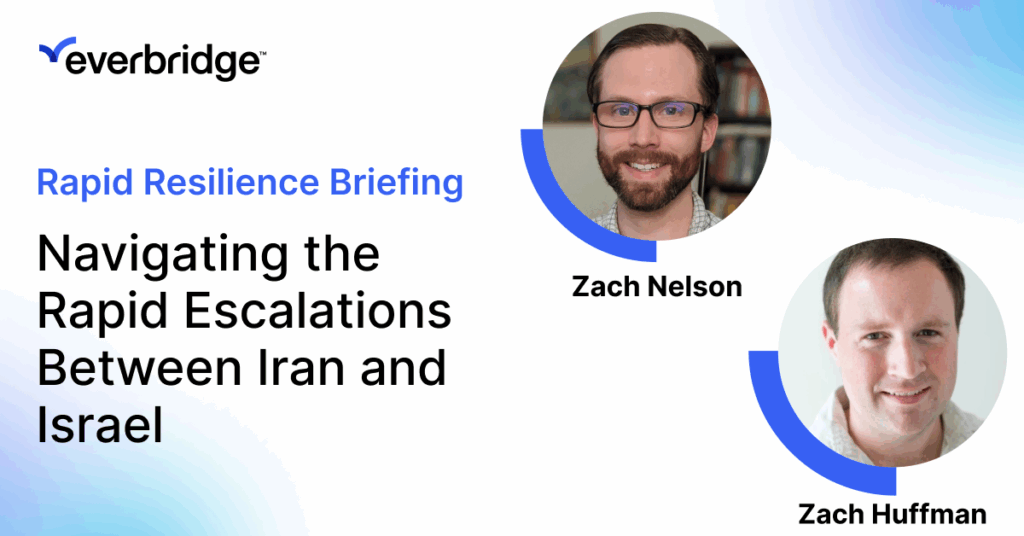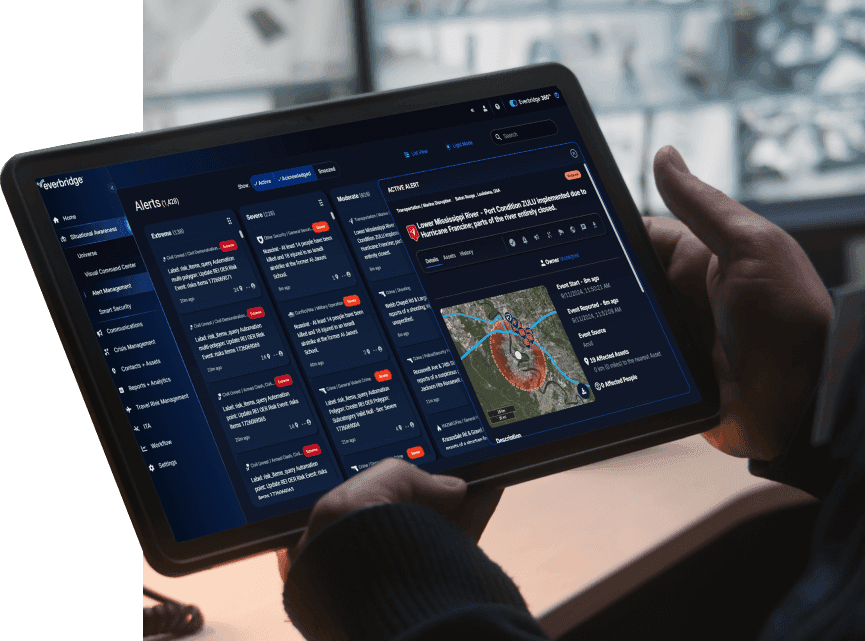In May 2024, Kenya experienced some of the worst flooding in its history, displacing
thousands and crippling infrastructure across the country. Among the most affected
regions was the Maasai Mara, a globally recognized wildlife tourism destination. Severe
flooding left entire communities and tourists stranded, with one group of three travelers
trapped on top of a water tower at a remote bush camp.
To support the emergency response situation, Everbridge rapidly deployed our emergency response team to coordinate a high-risk evacuation under extreme conditions.
Challenges
The Kenya flood crisis created urgent, life-threatening risks for people in isolated locations. Specific challenges included:
Impassable roads: Floodwaters destroyed road infrastructure, cutting off ground access to many remote areas and making conventional evacuations impossible.
Limited communication: Remote locations meant communication was inconsistent or delayed, complicating coordination and situational awareness.
Time-sensitive danger: With water levels rising and limited time to act, the stranded
individuals faced a rapidly deteriorating situation requiring immediate intervention.
Solutions
The Everbridge Security Operations Team, supported by our local security partner,
orchestrated a fast and effective evacuation under intense pressure.
Real-time threat visibility
The team received an urgent alert at 02:30 hrs on May 1st. Within 30 minutes, they assessed the scenario, identified the only viable evacuation method, helicopter transport, and began mobilizing resources.
Coordinated response execution
By 08:45 hrs, a helicopter was secured. Everbridge established a real-time communications group connecting the travelers, the client’s internal security team, local responders, and the Everbridge operations center. This ensured continuous updates, location tracking, and situational assessments throughout the mission.
Streamlined crisis management
The Everbridge team managed logistics, documentation, and stakeholder coordination
seamlessly. Approval was secured by 12:30 hrs, and the helicopter was en route by 13:40
hrs. At 15:15 hrs, the travelers were rescued and safely transported to Nairobi by 16:10 hrs, completing the operation within a remarkable 12-hour window.
Impacts and benefits
The Everbridge response to the Kenya floods illustrates the adaptability and effectiveness of our solutions under pressure. Key benefits included:
Accelerated life-saving response: A complete evacuation was executed in under 12 hours, from alert to safe arrival, despite remote terrain and damaged infrastructure.
Enhanced situational awareness: Real-time communication and location tracking enabled precise coordination and minimal delays.
Scalable crisis support: Beyond the initial three travelers, Everbridge coordinated support for an additional 30 individuals, arranging their safe transport and evacuation.
Strengthened partner collaboration: Integration with a trusted local partner ensured regional expertise and rapid deployment of on-the-ground resources.
Why this matters
This operation highlights the ability of the Everbridge team to deliver rapid, coordinated
responses during unpredictable, high-stakes emergencies. Whether it’s rescuing travelers in a natural disaster or protecting employees across a global enterprise, Everbridge ensures the right people, processes, and technologies are in place, when every second counts.
Five real-world cases where receiving the right care at the right time made all the difference
When crises strike, a swift and expert response can make all the difference. From medical evacuations to security extractions, these Everbridge Assist cases highlight the value of having a dedicated team of security, medical, and logistics professionals ready to act, ensuring your people receive the care and protection they need when it matters most.
1. Life-saving evacuation for a critical medical emergency
When a corporate traveler was hospitalized in Belém, Brazil with thrombosis, she was given a 50 percent chance of survival and just 24 hours to receive specialist treatment before her critical organs would fail.
The hospital lacked the necessary equipment and specialists, so Everbridge Assist stepped in. Everbridge quickly assembled a team of security, medical, and operational personnel. A bilingual security professional was deployed locally to assist with translation, provide support, and coordinate movements on the ground.
This enabled an emergency medical air evacuation. Within 12 hours, the patient arrived 3,000 km away in São Paulo, where she was successfully treated by a specialist capable of performing the complex surgery.
2. The right care for a life-threatening medical emergency
When a US employee of a global brand suffered a life threatening subarachnoid hemorrhage while on business in Shanghai, our assistance team was contacted by their colleague.
We immediately deployed a local agent to liaise with the hospital, obtain accurate medical updates, and provide translations to ensure smooth case management.
After confirming the hospital’s facilities were suitable, we arranged for the patient’s family to fly to Shanghai and stay nearby. We also assisted with completing insurance claims and work absence forms to ensure the employee’s salary continued without interruption.
Following recovery and convalescence in Shanghai, Everbridge provided door-todoor assistance for the whole family to return to the US, putting in place a medical handover to provide continuity of care.
3. Safeguarding personnel with a high-risk security extraction
When personnel found themselves at the center of a terror attack in Stockholm, Sweden, they placed an emergency call to their Global Security Operations Center, who immediately contacted Everbridge Assist.
A lone perpetrator in a van hit bystanders before crashing into the wall of our client’s office. With gunfire being heard and the security situation fluid, our team liaised with the employees directly, coaching them on how to shelter-in-place and barricade the doors until support personnel could reach them.
To ensure the safe extraction of the employees, our team arranged a car, driver and close protection officer. The employees were provided with the name, telephone number and photograph of the key close protection officer deployed, as well as a password that the individual would use as an additional identifier on arrival.
All the affected personnel were safely extracted from their office and escorted to safety.
4. Ongoing treatment and support for complex mental health case
A US student, undertaking her PhD in the UK, was struggling with underlying mental health issues and contacted our assistance team for help. During the initial assessment, our clinician flagged the case as high priority and arranged immediate counseling, face-to-face psychiatric appointments, and additional support. The case was complex, requiring the coordination of 5 separate health professionals, all arranged via our assistance team. To ensure that the patient had the medications she needed, we also collected and delivered her prescriptions directly to her.
Following treatment, the patient’s mental health condition stabilized sufficiently for her to be able to remain in the UK and continue her studies. We continued to support the student during her stay, monitoring her progress and providing additional care and treatment as and when her condition fluctuated.
As part of our service, we also offered professional trauma counseling and therapy support to the individuals concerned.
5. Coordinating multifaceted support for an expat dependent
The daughter of a British expat working in China was suffering with symptoms local doctors had attributed to recurrent kidney infections. When symptoms worsened the family contacted Everbridge Assist for assistance. Having reviewed the case and liaised with local doctors, our clinicians determined a more serious condition, organizing an MRI scan which revealed a potential tumor.
The patient had been treated at several hospitals with incompatible technology, making it impossible to share medical files. Our team collated and encrypted the data, transferring it to the most suitable medical facility, reviewing the history, and ordering further tests.
Due to the complexity of the case, it was agreed that the patient would be flown back to the UK for treatment, which we arranged. We then transferred her to the NHS for long-term care.
On June 13, 2025, escalating tensions between Israel and Iran reached a breaking point as Israel launched “Operation Rising Lion,” targeting over 100 nuclear and military sites. The aftermath saw retaliatory missile and drone strikes on Jerusalem and Tel Aviv, plunging the region into crisis. Amid the mounting instability, the Everbridge Security Operations Team faced a critical challenge to secure the safe evacuation of a British expatriate family stranded in Tel Aviv.
Challenges
The unfolding crisis presented urgent and complex challenges that demanded swift action and precision coordination:
Airspace closures:
- Israeli airspace was completely shut down, ruling out air travel as a feasible evacuation route.
Volatile security conditions:
- Ongoing attacks and regional instability presented significant risks, including unpredictable road conditions and potential threats along the escape route.
High demand for border crossings:
- Thousands of people sought refuge in neighboring countries, leading to overcrowded border points and extended delays.
With lives at stake and time running out, a clear, actionable plan was essential.
Solutions
Everbridge responded with a multi-faceted approach, in partnership with its RIMC team as well as leveraging its local partnerships, advanced technology, and crisis management expertise to deliver a timely solution.
Real-time risk analysis
Immediately after receiving the evacuation request, Everbridge conducted a rapid risk assessment. Two potential routes were identified for ground evacuation:
01 Travel to Sharm El Sheikh, Egypt, via the Taba border crossing.
02 Travel to Amman, Jordan, via the Jordan River border crossing.
The Jordan River route was assessed as the safest and most efficient option under the circumstances.
Coordinated execution
A detailed evacuation plan was rapidly mobilized:
- Dedicated security support: A secure vehicle, a trained security driver, and a Close Protection Operative (CPO) were deployed to escort the family to the Jordan river crossing.
- Pre-arrival preparation: Everbridge ensured the family was fully briefed on potential delays and the chaotic border conditions.
Despite the high volume of travelers, Everbridge maintained continuous communication with the family to provide situational updates and reassurance.
Seamless transition
Upon crossing into Jordan, the family met with the Jordan-based team from Everbridge, which included another secure vehicle, driver, and CPO. The team ensured the family’s safe arrival at Queen Alia International Airport, enabling them to board a flight to the United Kingdom.
Results
The Everbridge team managed a quick and coordinated response and brought the family to safety within an operational window of less than 36 hours. Additional outcomes illustrated expertise from Everbridge during this crisis:
- Safe evacuations achieved: The British expatriate family was transported seamlessly to the UK, avoiding immediate danger.
- Broader crisis support: Beyond assisting this family, Everbridge coordinated evacuations for other clients across the region, extracting personnel from high-risk zones such as Iraq and neighboring Gulf countries.
- Operational continuity in volatile conditions: Real-time intelligence and trusted local partnerships enabled ongoing evacuations amidst the constantly shifting security environment.
Despite the high volume of travelers, Everbridge maintained continuous communication with the family to provide situational updates and reassurance.
Why this matters
This high-pressure mission underscores the proven capability of the Everbridge team to deliver comprehensive, secure, and timely evacuations during volatile geopolitical crises. By integrating global resources, live intelligence, and expert crisis management, Everbridge once again demonstrated its commitment to safeguarding its clients when every second counts.
Challenges
A global biopharmaceutical company focused on serving patients and families affected by rare diseases often sees its personnel traveling to remote destinations. But when a number of its personnel found themselves caught at the center of a terrorist attack, it was in a rather more unexpected location.
A lone perpetrator driving a stolen van sped down a busy pedestrian street in Stockholm, Sweden, intentionally hitting innocent bystanders. The van then crashed into the corner wall of an office building where three of the client’s staff were working just floors above. On hearing the crash and subsequent gunfire, the locally based team placed an emergency call to their Global Security Operations Center, who immediately contacted Everbridge for assistance.
With a major incident unfolding outside their building, the affected employees were obviously fearful for their own safety.
Solutions
Aware that the security situation was fluid, Everbridge liaised with the employees directly, coaching them on how to shelter-in-place and barricade the doors until support personnel could reach them. The employees were then talked through the specific identification protocols that would allow them to correctly identify the local Everbridge support personnel who would be retrieving them from their office and escorting them to safety.
Provided with the name, telephone number and photograph of the key close protection officer deployed, the employees were also provided with a password that the individual would use as an additional identifier on arrival.
In order to ensure the safe extraction of the employees, Everbridge provided a car, driver and close protection officer. Both the officer and the driver were trained in security operations, close protection and defensive driving.
With the immediate area cordoned off by the local police, the Everbridge team staged the vehicle nearby and proceeded on foot to the client’s office. As the situation in the city was deemed a terrorist attack, the impacted personnel were duly extracted and escorted to an official meeting point away from the incident and outside the city limits, in order for them to connect with family members and loved ones.
Those employees unable to be collected from the staging area were delivered directly to their homes. The employees were obviously very shaken up by the experience. Although physically unharmed themselves, the incident had resulted in a number of fatalities and numerous injuries, which were steadily being reported by media.
Experienced in dealing with traumatic events, the Everbridge driver and close protection officer were able to provide the employees with reassurance and support on the scene in order to help calm them down and deal with the immediate effects.
As standard practice after the event, Everbridge offered professional grief counseling and therapy support to those affected.
The outcome
All the affected personnel were safely extracted from their office and escorted to safety. Through-out the operation, the Everbridge team kept in close contact with the client’s own Global Security Operations Center in order to ensure that they were kept fully abreast of the situation and reassured that their employees were in safe hands.
In our latest Rapid Resilience Briefing, James Burr, discusses the surge in antisemitic violence in Europe.
Full transcript
[00:05.0]
Hello everyone. Thank you for joining. My name is James Burr and I’m the Senior Regional Analyst for Europe Caucuses and Central Asia. I want to give you a quick briefing on an ongoing security risk, rising antisemitic violence across Europe with a focus on the recent attack outside the synagogue to the north of Manchester in the UK.
[00:24.6]
On October 2 during Yom Kippur A car ramming and stabbing outside the Heaton Park Hebrew Congregation killed two worshippers and injured several others. This was the most severe antisemitic attack in Europe so far this year, and authorities immediately labeled it an act of terrorism.
[00:42.9]
The timing on the holiest day in the Jewish calendar underscored the deliberate symbolic nature of the violence. But this isn’t an isolated event. Since the onset of the Gaza war in 2023, we’ve seen a surge in antisemitic violence, vandalism and intimidation across Europe.
[01:00.0]
And this trend has continued as we approach the second anniversary of that conflict erupting. In the UK alone, there are about 1,500 incidents recorded in just the first half of this year, an extremely high figure. France and Germany are also seeing similar patterns with attacks on synagogues, schools, Jewish leaders and cultural sites being reported this year.
[01:20.7]
Even smaller Jewish communities like those in Switzerland are being targeted. So why does this matter now? The Manchester attack highlights how antisemitic sentiments are manifested in acts of targeted violence. It also raises the risk of copycat incidents, particularly around Jewish holidays, or at high profile institutions.
[01:42.2]
Security services are responding with stronger patrols, but the overall threat environment remains elevated and geographically dispersed across much of Europe. For businesses or institutions directly impacted by these antisemitic attacks on their premises or in the vicinity, there are several implications.
[02:01.8]
Operations may be disrupted by lockdowns and road closures near attack sites. There are also knock on effects for supply chains, corporate travel security, insurance costs and even legal liability if firms fail to meet duty of care obligations.
[02:18.4]
Looking ahead, we assess with moderate to high confidence that antisemitic violence will stay elevated across Europe into 2026, with spikes during Jewish holidays and at moments of geopolitical tension. So what can organizations do? A few key resilience measures include upgrading site security, running vehicle ramming and active attacker drills, using real-time intelligence and alerting systems, and strengthening communication plans.
[02:47.5]
Partnerships with local law enforcement and geo security organizations are also critical, as are reviews of insurance and legal protections. In short, this is a sustained and regional trend that businesses and communities alike are encouraged to prepare for, not just an isolated crisis.
Join Everbridge to explore the evolving political and economic landscape in West Africa, focusing on the emergence of the Alliance of Sahel States (AES) and its implications for global businesses.
In our latest Rapid Resilience briefing, Everbridge Expert James Burr, breaks down the latest on the drone strikes in Poland that happened in the early hours of September 10.
Join Zach Nelson and Zach Huffman, as they discuss the latest updates on the ongoing tensions between Iran and Israel.
